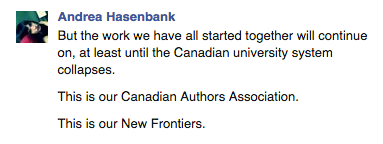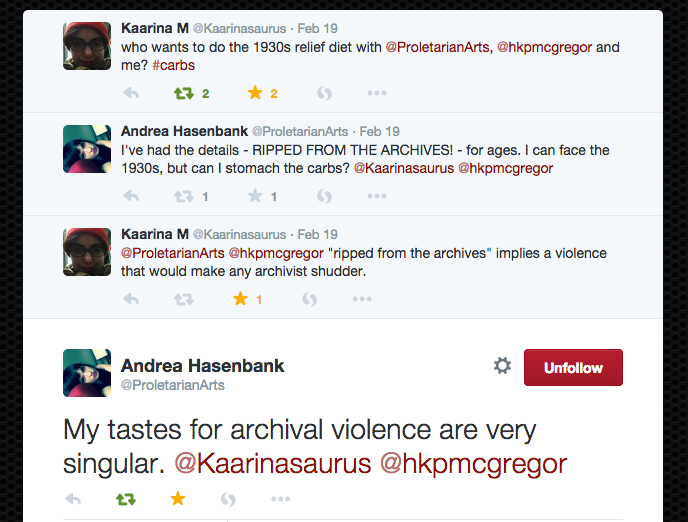Community
March 31, 2015
Community and Precarity
“Also, happy last day of EMiC.”
This message just appeared on a Facebook chat I’m having with three other EMiCites, as we discuss exactly how much social time we can fit into the upcoming Digital Diversity conference in Edmonton. Many of us are not attending DHSI this year — our normal summer meet-up spot — and so we’re treating DigDiv as a mini reunion.
It’s not really the last day of EMiC. A simple fiscal end-date will not spell the end of the projects and collaborations we began over the past seven years, many of which will continue in various forms and reverberate through our institutions and disciplines.
I have benefitted from tremendous research and training opportunities through my affiliation with EMiC. Since the first day that co-applicant Paul Hjartarson invited me, an utterly overwhelmed new MA student, for a coffee in HUB mall at the U of A and asked if I’d be interested in joining a project that would send me to Victoria to learn something about computers, EMiC has shaped my academic trajectory. The connections I made in that first year led directly to my current position as a SSHRC-funded postdoctoral fellow, back at the U of A and working with Paul again, now with five DHSIs under my belt and a somewhat more robust sense of what computers do. I am hugely grateful for having been in the right place at the right time.
But what I will value, more than the conferences and seminars and publications, is the community.
It will be news to absolutely no one that it’s a scary time to be an emerging academic right now. The discourse is positively apocalyptic. Many of us are leaving academia altogether, seeking out rewarding careers in different fields. Others hold on, trying to stay committed to the values of our teaching and research while experiencing the real costs of our precarity. I don’t use the word precarity lightly — we should never forget that our “shared precariouness” is not shared equally — but I use it here to underline how powerful communities can be in the face of this affective burden.
Professional opportunities can help to pave the way to exciting careers. Interdisciplinary and multi-institutional collaborations produce innovation and new knowledge. But communities preserve and support us; they give us perspective on what really matters, back us in our struggles, keep us sane and human in the face of systems that threaten to break us down.
I often talk about the collaborations that make my work possible, but I rarely talk about the communities that make it possible for me to do my work. As important as the days spent in DHSI courses, struggling with TEI and databases, were the nights at karaoke bars, bonding over nostalgic 90s alt-rock. And while I can’t say where my career will take me in the next five or ten or twenty years, I take comfort in knowing that I’ll always have a bunch of nerds to make #canlit jokes with me.



